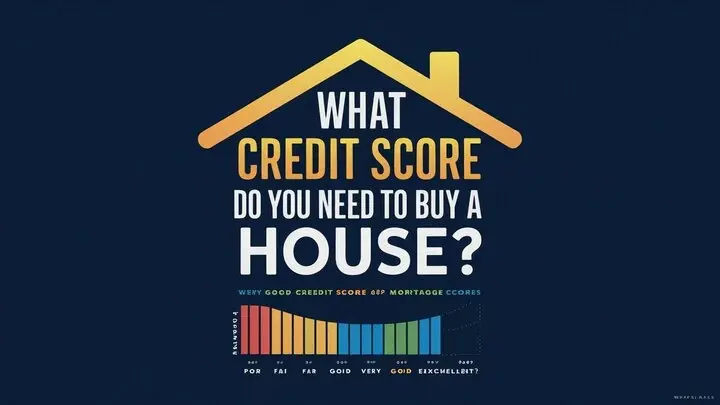
Purchasing a house is indeed one of the significant milestones that people experience However, it does come with the need for monitoring the financial aspect and also the credit score as well. It determines the kind of mortgage that you will be offered, including the rates and the terms that will be applied to the mortgage. Finally, the question ‘What credit score is required to purchase a home’? Let's break it down.
What is the minimum credit score required to buy a home?
Today, almost all mortgage lenders will only approve an FHA loan or conventional loan for applicants with scores of at least 620. While one can secure credit with a score of 580, this comes with the condition of making a down payment of up to 20%. It means that the better the credit history of an applicant, the better the mortgage rates and offers available.
Credit Score Range Mortgage Eligibility
- 760+ Excellent – Eligible for the lowest interest rate on the 30-year fixed mortgage and requires as little as 3-5% down payment. It’s hundreds of dollars a month less to borrow money which, if sustained over a 30-year mortgage, can easily add up to tens of thousands of dollars.
- 700-759 Very Good – Those with this score can secure low premiums on 30 and 15-year fixed mortgages to buy a home with a 5% down payment. Somewhat greater than the interest rates within the excellent tier.
- 660-699 Good – Conforms to the requirements given by an FHA loan with a 3.5% down payment. Also can be used to get a conventional loan with good rates, if the down payment is equal to or more than 10%.
- 620 to 659 Fair – This is often the lowest passing grade for an FHA loan that allows down payments as low as 3.5%. Traditional mortgages require a down payment of not less than 10% in this range of scores. You will indeed afford a higher mortgage insurance premium and interest rates than those individuals with a higher score.
- 580–619 Poor – They will be able to access a few health plans at elevated costs. Might have to upgrade your credit score first or begin with less demanding credit lending companies. Seldom be able to fit the criteria for a conventional loan without making a large down payment.
As you can see, even for the 620 credit score you need, you will be getting better mortgage terms, and save more as you are in the good to excellent credit score range of 660 and above.
Why Credit Score is Important When Applying for a Mortgage
Credit scores are seen by lenders as your past behavior in paying your debts and your future behavior in paying off your mortgage. If you score high, you are considered a low-risk borrower and are offered better mortgage rates. Several percentage differences in APR on your home loan could translate to tens of thousands of dollars difference over the term of the 30-year mortgage loan.
Besides affordable mortgage rates, higher credit borrowers might not have to pay for mortgage insurance as is usual when one finances less than 20% of the purchase price of a conventional loan. Usually, the better your credit rating is, the lower the amount of monthly mortgage insurance you’ll be required to pay or can get to meet the requirements to cancel it with less than the required home equity. Even these small amounts assist in reducing the expenses that come with owning a house.
How Mortgage Lenders Analyse Your Credit Report?
While your credit score gives lenders a quick snapshot of your creditworthiness, keep in mind they will also closely evaluate additional aspects of your credit report such as:
- How you have paid prior debts and other installments of the amount.
- The balances or accounts that are maintained and the different types of accounts.
- Total amount of credit card loans and the overall credit card use ratio
- Credit utilization and limit, credit reports, and “hard” credit inquiries from applications for new credit
- Bankruptcy, foreclosure lists, wage attachments, etc. which are available in the public records.
You should possess a clean credit report with no missed payments, a low credit utilization rate for credit cards, and few hard credit checks in the past year. Delinquent taxes or any past foreclosures or bankruptcies will make it almost impossible to get approved and have a low credit score.
Basic Guidelines to Follow Before You Get a Mortgage
If your credit score is slightly below the ideal credit score for getting the best mortgage deals, there are certain strategies that you can employ to improve your score in the future. In most cases strive to have a FICO score of 660 or above before applying for a mortgage. Tips to improve your score include:
- This means that I will pay all my bills on time starting from now and into the future.
- It is advisable to reduce credit card balances to maintain a utilization ratio of below 30% for optimal credit scores.
- It is also important not to apply for new credit before closing on the house, as it may lower your credit score.
- Pay off any outstanding accounts and fix errors that may be present in your report.
- Think about being added as an approved user to another person’s credit card if they meet the following criteria: long and perfect credit history.
The better the payment history that one can build and the lower the credit utilization ratio, the higher score one’s credit score will be. One must be patient and allow the credit building to snowball before applying for a mortgage because this will enable lenders to see an upward trend in the credit profile.
What is even better if it comes with a No Credit Card needed and No Credit Card application and NoCredit Check feature?
Pre-approval is particularly helpful during the early stage of home purchasing because the credit check performed by mortgage lenders during this stage is a ‘preliminary’ check of rates rather than a formal approval check which is known as a ‘hard check’. Soft inquiries to credit reports do not affect the score, and therefore it is alright to discuss with the lenders or check the published rate tables to know what the mortgage rate will be with the current credit score. The prices vary according to the prevailing market forces, and this is an aspect that always fluctuates.
When you get a pre-approval letter that comes with an estimated mortgage rate inclusive of the local standard interest rate and terms of repayment that fit your financial status, you can go shopping for a home with a clear understanding of the upper limit of your price range and the exact amount you can afford to pay every month for a specific target amount for a home purchase.
By utilizing credit score monitoring tools
Lastly, it is wise to monitor your credit report from time to time before planning to purchase a house. There are a lot of credit cards and even many personal finance sites including Credit Karma that offer free credit scores and credit reports for tracking. This also harms your score, especially when there are any signs of fraudulent activities such as identity theft. Any issues that arise can be spotted before you apply for your dream home loan and enough time is created to deal with them.
Purchasing a house is not an easy financial venture, and knowing the credit score range that will help one get a good rate of interest on their mortgage is basic information. Try to work towards establishing your credit history, reducing your debts, and obtaining a minimum of good to excellent credit score that starts at 660. This will position you for mortgage approval with the right interest rates and right terms to ensure that the overall cost of your home mortgage is optimized in the long run.



